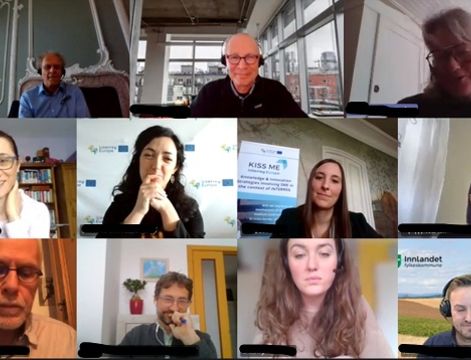
KISS ME Final Project Event
After 4 years of collaboration, the KISS ME project will end on 30 June 2021. Time to come together one last time to see what the project has achieved!
Europe's contribution must be a big step for an ever closer, ever stronger Union of stability and growth
Improving the innovation capacity in SMEs is one of the most important - and thus most common - objectives across Europe to reach the EU2020-goal of Smart Growth. A lot of policy instruments have been established to contribute to this objective. But it seems not easy to reach the SMEs with structural funds, especially in cross-border regions. In this context it is remarkable that different border regions with the same objectives and comparable policy instruments (e.g. INTERREG-Programmes) still use different strategies and projects to realise SME involvement. The KISS ME project partners will use these differences to improve their policy instruments addressing SMEs to develop, grow and engage in innovation processes.
Exchanging tools to reach SMEs and improving the policy instruments, the KISS ME-project objective is to strengthen the innovation capacity of SMEs by comparing the approaches of four different border regions. The partners involved in the project comprise the border regions of Germany and the Netherlands (Euregio Rhine-Waal), France and Spain (EGTC Pyrenees-Mediterranean), Hungary and Croatia (HAMAG BICRO), and Sweden and Norway (Värmland County Administrative Board; Hedmark County Council). Based on the findings, action plans will be developed which will then be implemented in a second phase. The project results will be disseminated at European level and will be valuable for all regions trying to support SME competitiveness jointly across borders.
€977,413.00
SME competitiveness
The INTERREG V A-programme Germany-Netherlands has a long history and has developed to the main policy instrument for cross-border cooperation between the two countries. Being approved by the Commission 2014 as the first CBC-programme in Europe, the INTERREG V programme focuses on economic development invovling SME (65% of the budget).
For the KISS ME project, the priority axis 1 “Increase of the cross-border innovation capacity of the programme area” is relevant, with Investment priority 1b and the specific objective “Increase of product and process innovations in sectors which are relevant for the border region”. Because of the specific focus, the policy instrument adressed has been specified to the first priority.
Despite various efforts in the framework of INTERREG A, cooperation is not self-evident. Euregio Rhine-Waal was involved in several INTERREG IV projects on the subject supporting different measures on cross-border innovation. Now, ERW, the Dutch Province of Gelderland and the German MWEIMH NRW are seeking for an integrated approach and new measures that can successfully be implemented in the programme. The use of financial instruments – which the INTERREG-programme does not foresee now but expicitly not exclude during the 2014-2020 period – might be improved by using experiences from other regions. Best practices from other European regions can be used by the partners to improve the programme in the future.
The EGTC has developed an Euroregional Innovation Strategy in 2014. The aim is to deepen cooperation between regions in different areas of specialization: water, ehealth and agri-food sector. This strategy defines two operational objectives aimed at creating conditions that favour the development of a Euroregional innovation eco system: foster shared knowledge of Euroregional actors and launch pilot projects.
The EGTC has started to implement the Euroregional Innovation Strategy with Calls of interest and the creation of different pilot projects but it is still early to talk about results. A lot of work should be still done. For an optimal implementation of the strategy, the EGTC is interested in the experiences of other European cross-border regions and organisations dealing with innovation in SMEs in order to implement and improve its own policy instrument.
With priority axis 1 and thematic objective 3, the INTERREG-Programme INTERREG V A Hungary-Croatia focuses on economic development and enhancing the competitiveness of SMEs in the border region.
To reach the specific objective fostering value added business co-operations between SMEs operating on different sides of the border, the programme introduced a special SME scheme. Objective of this SME scheme (also called "PP Light scheme") is to foster operating linkages between SMEs operating on different sides of the border by supporting joint SME development projects in the CBC programme with built-in special local project generation and management assistance mechanisms.
CBC SME projects should focus on one or more of the following main levels of cooperation:
- supplier chains
- joint product and technology development
- joint investment
Goal is to raise the average GVA per capita of industry and services sectors of the programme area.
The KISS ME-project partner HAMAG BICRO is the lead partner of this PP Light Scheme. That is also the reason of involving HAMAG BICRO in the partnership. As a lead partner and agency specialised for SME development and support, HAMAG – BICRO would like to analyse the policy instrument in the first years of implementation and based on analyses, suggest improvements for future similar grant schemes. This is especially important as cross-border SME projects are fairly new in the area.
The INTERREG-programme Sweden-Norway became operational in 1996 and has become one of the main policy instruments for cross-border cooperation between the two countries. With the priority axis 2 “SMEs” and thematic objective 2, “Increase the competitiveness of SMEs”, the programme focuses on stimulating entrepreneurship and innovation among SMEs in the border region, as well as facilitating cross border clustering and innovation processes. The programme specific output in the SE-NO INTERREG programme connected to this activity is “Increased Competitiveness in SMEs”, and the KISS ME project will contribute to reaching the programme area set indicator.
INTERREG SE-NO has proven to be a good instrument for fostering entrepreneurship, innovation and competitiveness among SMEs, but has a challenge with and potential to improve in relation to:
i) attract SMEs to engage in cross-border cooperation and
ii) to a larger extent facilitate cross border clustering, technology transfer, product and process innovation in order to increase the competiveness among the SMEs in the border region.
The KISS ME project will provide both programme level practices and project level practices that will improve the instrument related to these two challenges and contributing reaching the programme goals in relation to SMEs.

After 4 years of collaboration, the KISS ME project will end on 30 June 2021. Time to come together one last time to see what the project has achieved!
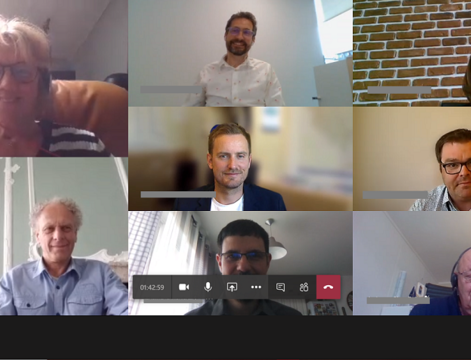
Project partners are never apart, maybe in distance but never in heart. The KISS ME partner met virtually to discuss action plan implementation!

KISS ME has successfully completed semester 6 - the first semester of phase 2!

KISS ME Partners from HAMAG-BICRO in Croatia and their Stakeholder visit the Lead Partner's Region
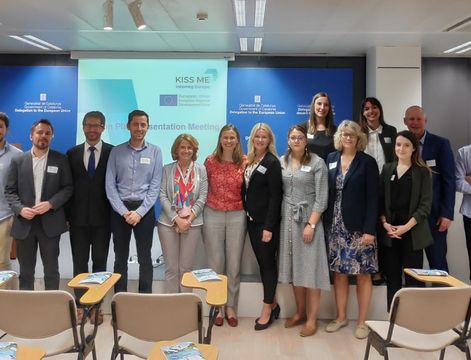
End of project phase 1: KISS ME project partners present their Action Plans in Brussels at the Delegation of the Government of Catalonia to the EU.

From 10. - 12.04.19, the KISS ME partners & stakeholders had their last KISS ME Interregional Meeting & Site Visit, organised by Hedmark County Council in Hamar
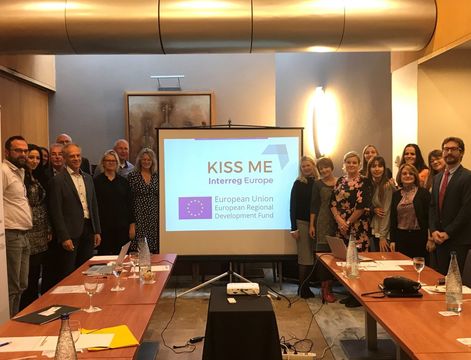
3rd KISS ME Interregional Meeting - this time, focusing on the topics "Intellectual Property" and "Entrepreneurial Dimension: how to help SMEs get bigger?"

In the context of the EU's new GDPR, we would like to ask all our contacts and friends of the KISS ME project to sign up for our newsletter!
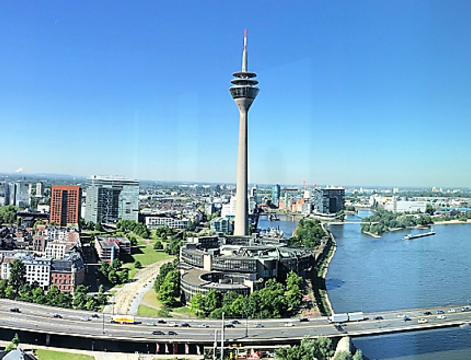
The KISS ME Partners and their Stakeholder met for the second time for their interregional Meeting with site visit & steering group meeting.
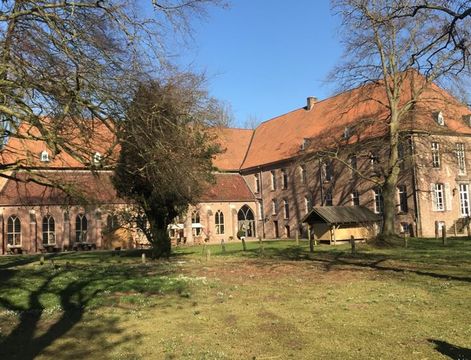
After a cancelled meeting in December due to snow and ice, the local stakeholders of the Euregio Rhine-Waal now gathered for an informal fireside chat